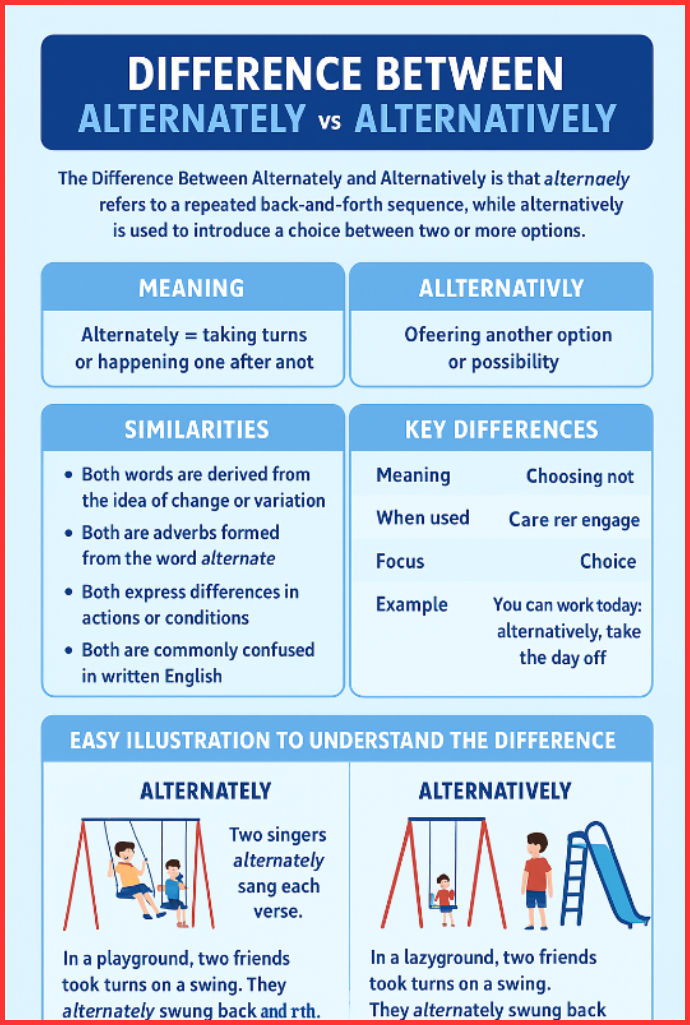The Difference Between Alternately and Alternatively is that alternately refers to actions that occur in a repeated back-and-forth sequence, while alternatively is used to introduce a choice between two or more options.
In simple words,
Alternately = taking turns or happening one after another,
Alternatively = offering another option or possibility.
Meaning of Alternately
Alternately refers to things that occur one after the other in a repeated or rotational pattern. If two or more actions or conditions happen in turns, they are happening alternately.
It describes a sequence or cyclical repetition.
Example contexts:
- Breathing alternately through each nostril in yoga.
- Two teammates alternately taking turns performing a task.
- A machine switching alternately between two operational modes.
Alternately Etymology
The word alternately comes from:
- Latin alternus, meaning “one after another” or “by turns”
- English suffix -ly, used to form adverbs
Original meaning: happening by alternating turns or sequences.
Sentence Examples of Alternately
- The traffic lights changed alternately between red and green.
- The two runners alternately led the race during the final lap.
- She alternately smiled and frowned while reading the novel.
- The fans were alternately cheering and silent during the tense match.
- The weather alternately shifted between warm sunshine and cloudy skies.
Alternately Attributes
People use alternately when describing:
- Repetitive switching
- Actions occurring in turns
- Cyclical or back-and-forth patterns
It emphasizes sequence, not choice.
Meaning of Alternatively
Alternatively introduces another choice, option, or possibility. It signals that there is more than one way to do or consider something.
It is commonly used in:
- Decision-making
- Logical explanations
- Suggestions or recommendations
Alternatively Etymology
The word alternatively comes from:
- Latin alternare, meaning “to change or substitute”
- English usage evolved to mean “another option is available.”
Original meaning: “in place of something else.”
Sentence Examples of Alternatively
- You can take the bus; alternatively, you may walk if the weather is nice.
- We could order food; alternatively, we could cook at home.
- The meeting can be held today; alternatively, we can postpone it.
- She may choose to study science; alternatively, she can pursue arts.
- You can invest in mutual funds; alternatively, try fixed deposits.
Alternatively Attributes
When we say alternatively, we are:
- Suggesting another option
- Offering a different choice
- Presenting an alternative route or plan
The focus is decision-making, not sequence.
Similarities Between Alternately and Alternatively
- Both words are derived from the idea of change or variation.
- Both are adverbs formed from the word alternate.
- Both express differences in actions or conditions, though the context differs.
- Both are commonly confused in written English.
- Both relate to situations where more than one thing is involved in some way.
Key Differences Between Alternately and Alternatively
| Feature | Alternately | Alternatively |
| Meaning | Happening in sequence, taking turns | Offering another option or choice |
| When Used | Describing repeated or back-and-forth action | Presenting a different possibility |
| Focus | Sequence | Choice |
| Example | The lights alternately flashed red and green. | You can go by bus; alternatively, take a train. |

Difference Between Alternately and Alternatively — Easy Illustration
Alternately:
Two children are taking turns swinging on the swing.
First child swings → then second child swings → repeat.
They are swinging alternately.
Alternatively:
A child can choose either to play on the swing or go down the slide.
They have options — they can choose one or the other.
Story Example: Alternately vs Alternatively
In a school playground, two friends, Meera and Aisha, loved the swings. Since there was only one swing, they decided to take turns.
Meera played first, then Aisha played next, and they repeated this.
They were swinging alternately, one after the other.
Meanwhile, their friend Rohan walked by. He looked at the swing but didn’t want to wait.
Rohan realized he had another option.
He could either wait for the swing or go play football on the field.
He alternatively chose football.
Meera and Aisha were using the swing in rotation,
while Rohan made a choice between two activities.
This clearly highlights the Difference Between Alternately and Alternatively.
Conclusion
Understanding the Difference Between Alternately and Alternatively helps in using both words correctly:
- Use alternately when describing actions or events that happen in turns.
- Use alternatively when offering another choice or option.
Using these words accurately improves clarity in speaking and writing.
FAQs – Alternately vs Alternatively
Alternately means actions happening one after another, while alternatively introduces another option or possibility.
No. They have different meanings and should be used based on context—sequence vs choice.
Use alternatively.
Use alternatively.
Because they look similar and both relate to change. However, their usage context is what differentiates them.
Read Next: